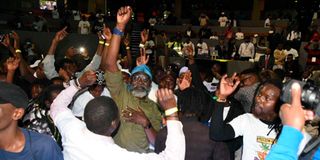Could Wajackoyah’s ‘legalise ganja’ candidature be Raila’s secret card?

Roots party presidential candidate George Wajackoyah joins his fans in dancing to reggae music at KICC during the launch of his manifesto on June 30, 2022.
What you need to know:
- There are a range of possible options that the government can use to tip the scales in Raila’s favour.
- Sponsoring a third candidate to split votes expressly, or subtle nudging behind the scenes, is one possible option.
In their book, How to Rig an Election, Nic Cheeseman and Brian Klaas explain the pseudo-democratic tactics employed by despots around the world to remain and gain power through elections.
One example they give is Ukraine’s 2004 presidential election. Voters turned out in opposition strongholds, hoping to oust the incumbent, Viktor Yanukovych. Upon arrival at their assigned polling stations, they received their crisp ballot papers and pens to mark them with. They dutifully ticked the box for the opposition. Then they slipped their cleanly marked ballot papers into the ballot box to be counted.
Having done their democratic duty, they left.
Four minutes later, their ballots were blank. Although the opposition voters did not know it, they had been given pens that were filled with disappearing ink. The ballot boxes were filled with stacks of unmarked ballots. Despite such dirty tricks, Yanukovych eventually lost. Election observers noticed the disappearing ink trick, leading to the election being rerun.
Another example they give is in Russia. In the 1998 St Petersburg local assembly elections, Oleg Sergeyev was running for re-election. The city’s governor, Vladimir Yakovlev, disliked him. Yakovlev came up with a trick to bring down Oleg. Names of two of Oleg’s opponents were similar: Oleg Sergeyev and Oleg Sergeyev. The first was a pensioner, the latter an unemployed man. Neither had any qualifications for the office. But they had been handpicked for one key characteristic: their names.
When voters arrived in the polling booth, they were unsure which Sergeyev was their candidate of choice. Many cast ballots for the “wrong” Sergeyev, which split the vote and contributed to Sergeyev’s downfall, exactly as Yakovlev had intended.
The Kenyan government now supports Raila. There are a range of possible options that the government can use to tip the scales in Raila’s favour.
Struggling youths
Sponsoring a third candidate to split votes expressly, or subtle nudging behind the scenes, is one possible option.
So, is Wajackoyah Raila’s secret card aimed at scuttling Ruto’s bid? It is common knowledge that Ruto is popular among the youth across ethnic divisions. His bottom-up economic model and hustler narrative has caught the imagination of the struggling youths. Polls have consistently affirmed his popularity among this cohort of voters, including the non-tribal millennials.
Research has affirmed political and social preferences of this new crop of youths. It supports climate change causes. It has a liberal view on social matters. Some thinker must have reasoned that the best way to sway this cohort away from Ruto was by sponsoring a candidate that speaks to an agenda that resonates with this age set.
The ganja agenda, which Wajackoyah is now pushing, is clearly unpopular with the elderly, churchgoing and mature voting bloc. But this is not necessarily the case among the modern-day youths. Ganja remains illegal but Wajackoyah is selling this anti-law agenda in broad daylight while under police protection. He has been getting acres of free media publicity which, speculatively, might have been pushed by some hidden hand. His co-competitor Mwaure has barely featured in the media.
Wajackoyah’s manifesto launch featured on Citizen TV prime time hour of 9pm, juxtaposed with Ruto’s. In comparison, Raila’s launch was aired on prime time without any interruption.
Wajackoyah has been quoted as endorsing Raila in Kisumu. Since when did political competitors endorse each other?
Weaponising institutions
One Azimio thinker has been quoted saying Azimio may legalise ganja if the coalition wins. Furthermore, both Raila and Wajackoyah are known reggae lovers.
One also wonders, how did so many aspirants fail the IEBC presidential nomination test? Was the rigorous process deliberate so that the political field is whittled down to a small number that includes a ganja-promoting candidate who can tilt the scales?
The government has a clear motive of stopping Ruto from ascending to power. The government tried weaponising institutions against Ruto and failed. Atwoli was quoted saying Ruto would not be on the ballot and failed. Maybe this ganja trick is the government’s last bullet in its futile attempt to stop Ruto.
A disclaimer is important here. I do not authoritatively assert that Wajackoyah is working expressly for Raila to subvert Ruto. I might be wrong. Maybe Wajackoyah does not know of the subtle help he is getting from the government. But these coincidences are too many.
But if indeed Wajackoyah is running a bona-fide campaign, I can only ask him to listen to Robert Nesta Marley’s song, “Rat race”
I have corrupted the lyrics as follows: “Wajackoyah don't work for NSIS... When you think there is peace and safety, a sudden destruction, collective security for surety. Don’t forget your history, know your destiny. In the abundance of water, the fool is thirsty.”
Dr Kang’ata teaches law at Catholic University of Eastern Africa and is the Murang’a senator. He is a former Senate Chief Whip.





